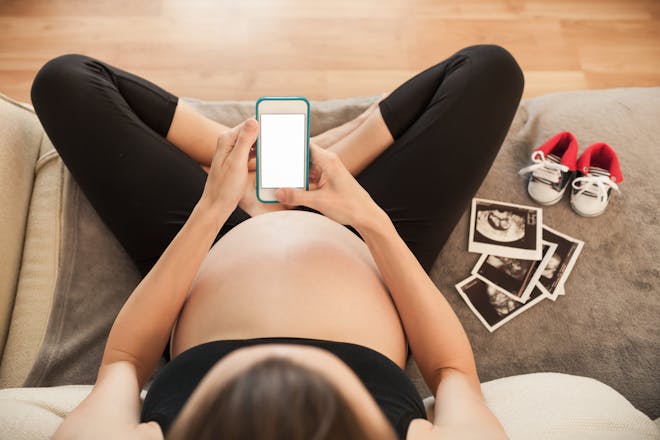Find out what to expect now that you're 16 weeks pregnant and into your second trimester. You may feel the first flutters of your baby's movement this week. Plus, what to expect at your 16-week appointment.
This page contains affiliate links, which means we may earn a small amount of money if a reader clicks through and makes a purchase. All our articles and reviews are written independently by the Netmums editorial team.
What's happening at 16 weeks?
Here are the key things you can expect from your pregnancy at this stage:
- You might feel the first flutters of your baby's movement.
- Second-trimester constipation may set in.
- Your 16-week antenatal appointment.
- You'll hear your baby's heartbeat.
How big is your baby?
Your baby's around as long as a Fudge bar this week, weighing around 100g and measuring about 11.5cm from crown to rump.
That tiny little body is moving about pretty vigorously inside you now, sometimes hiccuping, which you'll be able to feel in the coming weeks. You may even be able to feel these twirling movements already (see below).
FREE NEWBORN NAPPIES
Your baby may only be tiny still but they can already form a fist and throw (gentle) punches – and even find and suck their thumb! Those teeny hands might be able to feel and pull the umbilical cord, too – it's like baby's first toy!
You baby makes facial expressions already like frowns and squints, although they can't control these just yet.
From now on, your baby's development is mainly focused on one thing: growing! Your little one's about to undergo a growth spurt, so get ready for a growing bump and more noticeable movements!
What's going on with your body?
Although many classic pregnancy symptoms like sickness and fatigue often get better in the second trimester, there's one super-glamorous symptom that can often get worse: constipation .
Constipation is common in pregnancy, because the changes to your hormones affect your digestive system. It can be especially bad if you're taking iron supplements (but if your GP has prescribed them, don't stop taking them without talking to a doctor first).
According to the NHS , you may be constipated if you haven't done at least three poos in the past week, your poo is hard, dry and lumpy, or it hurts when you do a poo.
You can often ease pregnancy constipation yourself by:
- eating high-fibre foods, like fruit, veg and wholemeal carbs
- drinking plenty of water
- exercising regularly
If these tips don't help, see a pharmacist. They can help you choose a laxative that's safe to use while you're pregnant.
You may also notice your eyes feel sore . This is due to hormonal changes that can make them dry. Ask your dcotor to prescribe some lubricating drops to help. Remember prescriptions are free during your pregnancy.
What to expect this week: movement
Feeling your baby move for the first time can happen anytime around now. You may have felt those first flutters already if you're lucky. But don't worry if you haven't. Some first time mums don't feel anything until much later in the second trimester.
So what does it feel like when you first feel movement? Some mums-to-be describe it like bubbles, twitching or butterflies. It can even feel like gas or trapped wind quite low down.
If you've not felt anything yet, try lying down and relaxing as that's when you're most likely to feel something.
At this stage, these flutters are reassuring but won't necessarily have any pattern or regularity to them. As your baby grows, the flutters will turn into kicks and movement that you'll recognise and expect at regular times, such as when you're hungry, lying down, have eaten, gently prod your bump etc.
Until then, enjoy the flutters!
Wondering when your partner will be able to get in on the baby-moving action? You've probably got at least another month to go. It's usually not until at least 20 weeks that other people can feel your belly move when your baby does – and sometimes it takes much longer than that.
In the meantime, your partner can still talk, sing and read to your bump; it's great for bonding and will help them to be more involved in your pregnancy.
What to do this week: talk to your midwife
You'll have your 16-week antenatal appointment this week, so be sure to take along any questions (as well as your notes).
Here's what to expect at your 16-week appointment:
- your midwife will weigh you
- your pee will be tested with a dipstick for protein (as this can be a sign of UTI or pre-eclampsia)
- your blood pressure will be checked
- you'll hear your baby's heartbeat for the first time (since seeing it on your dating/nuchal scan)
- you'll receive your test results from your previous blood tests
If you've had to have an amniocentesis for further Down's syndrome testing, this may take place this week, too. Again, make sure you ask any questions about what to expect and what to do when you get your test results.
If you have any concerns at all about your health, or the health of your baby, now is the time to mention them. There is absolutely no such thing as a silly question!
Try not to worry about your midwife judging you. Most midwives have seen it all before, and they understand that some aspects of having a healthy pregnancy can be a struggle. Your midwife is there to support you and your baby's health, so take full advantage of it and ask anything that's on your mind.
If you're not happy with your midwife, or feel you need a second opinion, ask for the contact details for the midwifery supervisor in your area.
If you get any bad news at your antenatal appointment, it can be hard to know how to react. You usually won't have to make any decisions there and then. It can be a good idea to ask for extra time, or even counselling, to help you get your head around your options.
Your 16 week to-do list
1 Your next appointment is the 20-week anomaly scan. Read up about it here .
2 If you do yoga or relaxation classes, your teacher may recommend lying on your side, rather than your back (for longer periods of time.) This is because your growing uterus can compress blood vessels and can cause dizziness.
(Advice for going to sleep on your side rather than on your back is recommended once you reach 28 weeks, although there's no harm in getting used to side sleeping before that.)
3 Put your feet up when you can – this can help with puffiness and also varicose veins, which can appear during pregnancy.
4 Now that you've (hopefully) made it through any morning sickness, book yourself a spa session or treatment. You deserve some pamper time!
5 Have you joined your due date club yet? It's the perfect way to connect with other expecting parents who are due at the same time as you. You could even encourage your partner to sign up, too!
What to watch this week...
Get expert tips on what to expect at 16 weeks pregnant from our midwife.
What happens next week...
Want to know what happens when you're 17 weeks pregnant ? Or to remind yourself what you read last week ? Click on the numbers above to find out more about what to expect when you're that number of weeks pregnant.







